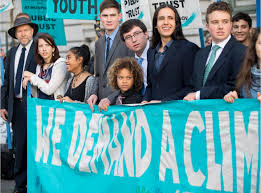The End of the Juliana Litigation–Or Is It?
Ninth Circuit Court of Appeals Denies Rehearing, But Landmark Climate Change Litigation’s Impact Will Endure

Last week, the U.S. Court of Appeals for the Ninth Circuit denied rehearing en banc in one of the nation’s most closely-watched climate change lawsuits: Juliana v. United States. But the legal and policy impact of this landmark litigation will endure. And the case itself may not be concluded.
Juliana involves a novel legal argument: that the federal government’s longstanding, affirmative conduct–for example, in facilitating the extraction and combustion of fossil fuels–contributes significantly to climate change. That, the children plaintiffs argue in Juliana, violates both their substantive due process rights and the government’s public trust responsibilities to both them and future generations. (My Legal Planet colleagues and I previously posted on the Juliana case when it was first filed in 2015 and, more recently, here and here.)
To recap briefly, a U.S. District Court Judge in Oregon refused to dismiss the plaintiffs’ “atmospheric trust” case in 2016, strongly suggesting in a lengthy opinion that she thought their claims had legal merit. However, the Trump Administration obtained review of that ruling in the Ninth Circuit, where in January 2020 a divided 2-1 panel concluded that the plaintiffs lacked legal standing to bring the lawsuit. (Notably, however, both the majority and dissenting opinions embraced the scientific certainty of climate change while acknowledging the executive and legislative branches of government’s abject failure to address the issue in any meaningful way.)
The plaintiffs promptly sought rehearing en banc by the Court of Appeals. The petition languished there for over a year–an extraordinary amount of time under the circumstances–until the Ninth Circuit denied rehearing in a brief February 10th order.
What now?
The Juliana case is technically not over. The plaintiffs could seek review by the U.S. Supreme Court, though they would be unwise to do so. That’s because seeking and obtaining review risks the Supreme Court’s revising–and potentially reversing–the High Court’s landmark 2007 climate change decision in Massachusetts v. USEPA. There a bare 5-4 majority held that states had legal standing to challenge EPA’s refusal to regulate GHG emissions; declared those GHGs to be “pollutants” subject to regulation under the Clean Air Act; and ruled that the federal government had abused its discretion in its decision not to regulated GHG emissions under the Act.
Only one justice who joined the majority opinion in Massachusetts–Stephen Breyer–is still on the Court. And three of the dissenters in that case–including Chief Justice Roberts–remain on the Court. Meanwhile, three more conservative justices nominated by former President Trump are now on the Supreme Court, providing a solid block of six justices who are likely unsympathetic to the plaintiffs’ arguments in Juliana, to the legal precedents established in Massachusetts, and in general to any activist role by the federal judiciary when it comes to climate change litigation.
Accordingly, seeking Supreme Court review in Juliana would appear to be a major strategic error, with potentially profound, adverse consequences.
But the spirit of Juliana lives on.
That’s because–largely unreported by the media–a number of lawsuits have been filed in state and federal courts around the nation predicated on similar legal theories and the very same litigation template advanced in Juliana. It thus seems likely that the momentum initially sparked by the Juliana case will be perpetuated in these related cases. Those lawsuits filed in state (rather than federal) courts seem especially encouraging, since restrictive federal standing-to-sue principles are generally inapplicable in state court systems.
And here’s an alternate, “Hail Mary” scenario to ponder: the Juliana litigation engendered a vitriolic–though ultimately successful–legal response from the Trump Administration. But the case technically remains pending for a short period of time. It’s possible that the Biden Administration takes a far more benign view of the Juliana case, which could conceivably translate into settlement of the litigation on terms at least somewhat favorable to the Juliana plaintiffs. Again, that scenario seems unlikely for all sorts of reasons, but it’s an intriguing possibility.
In any case, the climate activists and their attorneys who launched the Juliana case can take considerable satisfaction from the fact that the legacy of that litigation will endure. And their work on this particular climate change litigation front is not yet done.
Reader Comments
5 Replies to “The End of the Juliana Litigation–Or Is It?”
Comments are closed.






Now that the democrats have majorities in both the House and Senate, is there a possible legislative “fix” to meet the objectives of the Juliana case?
I can’t address this from a legal perspective, since I’m not qualified, but given the objectives and asks of Juliana — which I agree are wholly worthwhile — it would be wonderful if Congress acted to put them into law, but I have serious doubts they will or would. I think even Democrat Joe Manchin would have serious reservations.
I can’t address this from a legal perspective, since I’m not qualified, but given the objectives and asks of Juliana — which I agree are wholly worthwhile — it would be wonderful if Congress acted to put them into law, but I have serious doubts they will or would. I think even Democrat Joe Manchin would have serious reservations.
I dont see any reason to expect anything significant on the PEA front. Biden’s nominee for EPA mostly has a nice smile: https://www.nature.com/articles/d41586-020-03621-6
I dont see any reason to expect anything good from Biden’s nominee for EPA: he’s the typical Establishment front man https://www.nature.com/articles/d41586-020-03621-6